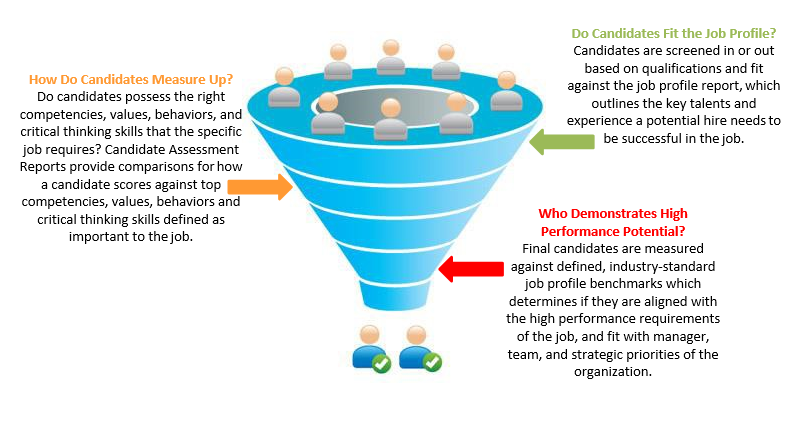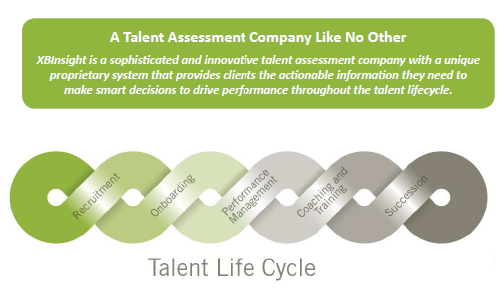The numbers don’t lie. The traditional approaches to hiring the right talent for a position haven’t exactly proven successful. The rate and cost of hiring mistakes is well, unmistakable. According to a recent survey, companies lost an average of $14,900 on every bad hire they made in the past year, and nearly three in four employers (74%) say they’ve hired the wrong person for a position.
And, consider this. Skilled researchers pored through 85 years of scientific literature in a groundbreaking meta-analysis, to identify which employee selection methods were the best predictors of job performance. Of the 19 methods studied, structured interviews came in 3rd place, unstructured interviews placed 9th, years of job experience came in 14th and years of education came in 16th.
This extensive research finds most traditional methods of selecting employees are deficient at predicting job performance and goes a long way toward explaining why there are so many hiring mistakes. As they say, the definition of insanity is doing the same thing over and over and expecting different results, yet isn’t that what we in the HR field have been doing? Applying the same, traditional methods of screening resumes, conducting interviews, and relying often on gut feel.
Interestingly, the researchers conducting the meta-analysis found the best predictors of job performance were general mental ability, such as IQ, and applying critical thinking and competency skills on work sample tests. Today, we call these methods “talent assessments,” and it is revolutionizing the way companies hire talent.
Talent Assessments: The Starting Point of Business Performance
The ability to gain more knowledge about a potential hire and predict their future success in an organization before investing in them, is achievable through talent assessments. And, more and more of the world’s leading organizations are utilizing talent assessments to gain this critical insight. In fact, according to a 2018 Global Assessment Trends Report, organizations are currently using assessments or plan to use them in the near future for high-potential identification (82%), leadership development (82%) external hiring (79%), career development (79%) and internal hiring (72%) – reaffirming the pervasive use of assessment for core HR processes.
Talent assessment solutions can provide data-driven, scientific-based insight into hiring decisions. Through objective data and insight around competencies, critical thinking skills, values/culture and behaviors, hiring managers depend less on their “gut feel” about a candidate, and can better evaluate them against a set of criteria that are important to a job and to their organization.
Making hiring decisions based on relevant job criteria, not instinct, is simply smart business. In fact, 57 percent of organizations know that employing pre-hire assessments enables them to hire the most potentially successful employees. And, using pre-hire assessments has been shown to lower turnover rate among high potentials by 39 percent. One company cited in Bersin’s report experienced a $4 million revenue increase within six months of using a data-based screening and hiring process.
The XB Assessment Platform for Hiring Best-Fit Talent
Assessment solutions are the next evolution in hiring talent that is the best fit for the job. XBInsight, a sophisticated and innovated talent assessment company, is helping business leaders and HR executives redefine the selection and hiring process. It provides a more strategic approach, going beyond resume scanning and interviewing to find the right talent.
Resumes and interviews are essential to the hiring process, but only help to determine if a person has the right degree of experience or qualifications needed for a particular position. They provide very little insight into whether a candidate has the right behaviors, values and competencies for the job.
Most, if not all, jobs have a behavioral requirement that must be met if a candidate is going to succeed and perform at high levels. Even for these “soft” skills, data-based and evidence-based assessments can uncover if candidates’ behaviors and values will match up with the job requirements, and those of the manager, team and overall company culture. Our assessment solutions allow you to make hiring decisions based on relevant job and behavioral criteria, not instinct.
Sourced Candidates with Basic Job Qualifications
Candidates have been screened using traditional methods, reviewing resumes, applications to determine if they have the right level of experience and qualifications required for the job.

Think Beyond Hiring for the Job
Assessments go beyond finding the right talent for the job. They can more accurately predict future performance, and help identify talent that will have long-term impact on the business. Pre-hire assessments not only allow companies to find the people that can perform the job today, they actually create a workforce that will lead them well into the future.
The most successful succession plans are those that focus on every employee from the moment they are onboard. Developing leaders internally takes time and resources, but research has shown that homegrown candidates are more likely to be successful than external hires. Using assessments from the initial hiring process throughout the employment life cycle assures companies create a specific model for every job that defines the competencies, behavior, values and thinking necessary to succeed in the role. An effective succession plan compiles this valuable data on each employee, compares it to the needs of current and future roles, and tracks employee progress toward being prepared to fill those positions. Best-in-class succession plans begin with assessment data from the hiring process.
Conclusion: A New Standard
The growth of talent assessments to better inform hiring decisions isn’t surprising when you consider it is literally the point at which organizations can most influence the talent they have to execute their business strategy. The outcome is a more strategic approach to hiring that identifies talent who can fill broader roles; deliver performance and productivity faster; develop and advance quicker; and fit within your company culture. And, talent assessments conducted at the hiring phase are the cornerstone of succession planning – a must-have in today’s competitive employment and business landscape.

